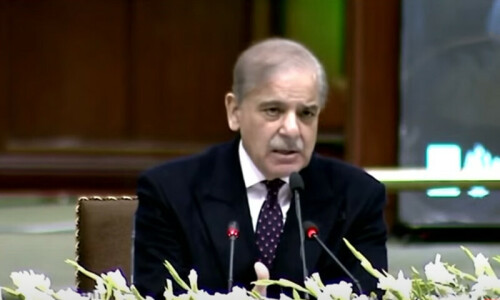
PAKISTAN has been fighting a battle against the threat of malnutrition, at least for the past 10 years.
Despite a multitude of programmes in place, the country’s nutrition indicators seem to be on a downward spiral. Some even believe that the country is fast approaching a point where declaring a national nutrition emergency no longer seems a far-fetched idea. Provincially speaking, Khyber Pakhtunkhwa has already done so.
In Sindh alone, the last known survey to give an overview of the nutrition situation, the Multiple Indicator Cluster Survey of 2014, revealed alarming rates of stunting, wasting and child mortality.
The infant mortality rate is 82 deaths per 1,000 live births while under-five mortality is at 104 deaths per 1,000 live births. More than 42pc children under the age of five are underweight, 48pc children under five years are stunted or short for their age and 15pc children are wasted or thin for their height.
More often than not, investment in nutrition is considered to be a moral obligation: an ancillary factor when talking about the protection of human rights and recognising good governance.
And yet, the loss to the future workforce as a result of malnutrition is valued at $2.24 billion per year, according to a collaborative paper between the nutrition section of the Ministry of Planning, Development and Reform and the World Food Programme’s country office in Pakistan.
The “cost of doing nothing”, as stated in the report, “totals $7.6bn annually for Pakistan, which corresponds to nearly three per cent of GDP”. It highlights the importance of investing in sustained human development which offers “a $16 return for every $1 invested”.
It is high time the government looked outside the traditional models and leveraged new and innovative projects already in place for greater impact
As the situation gains further urgency, there is a need for all those involved to take a step back and analyse the interventions put in place.
Although multi-sector programmes have been introduced after the realisation that nutrition cannot be dealt with by the health department alone, it is now time to look outside the traditional models and to leverage new and innovative projects already in place for greater impact.
The last Global Nutrition Report emphasised that “opportunities through innovative financing mechanisms and existing investment flows for multiple wins in multiple sectors need to be explored”.
One such connection seems to be in the Benazir Income Support Programme (BISP). It is trying to link nutrition awareness with poverty alleviation through conditional cash transfers (CCT), using private sector’s mobile cash transfer networks like Easypaisa and UBL Omni.
BISP, despite being heavily criticised by some quarters, can be a step in the right direction. Dr Zulfiqar Ali Bhutta, one of the world’s leading experts in nutrition, states that while he is all for meaningful targeting through BISP, he has his reservations.
Dr Bhutta says that he cannot support “a model where the middleman takes up to a third of the monthly allowance for just encashing BISP cards, as seems to be happening in some places. An effective CCT programme like the models of South America (eg Oportunidades, now rebranded as Prospera) can be emulated.”
Prospera is a poverty alleviation programme implemented in Mexico. With a structure similar to BISP, its three chief components are education, health, and nutrition. What set the programme apart was its rigorous independent evaluation of programme impact and emphasis on accurate, credible data to measure effectiveness.
More often than not, investment in nutrition is considered to be a moral obligation: an ancillary factor when talking about the protection of human rights and recognising good governance.
A Cornell University study, however, stated that conditional cash transfers in Mexico, for political and logistical reasons, often did not reach the rural poor and were largely regarded as inefficient.
For Prospera to be successful, an external firm, the International Food Policy Research Institute, was hired to conduct the evaluation, along with some academic economists.
Building on this, Dr Bhutta points out that the main component of Prospera’s success is lacking in local projects such as BISP. He cites abuse by banks and financial institutions as the reason behind discrediting microcredit programmes.
“Cash transfers work but require strong government support, oversight and community participation,” he adds. “What we need in Pakistan is transparency in terms of implementation and reduction in corruption.”
Another innovative way to tackle the malnutrition issue is the health star system adapted in Australia. Its official website states, “The Health Star Rating system is a front-of-pack labelling system developed for use in Australia and New Zealand.”
A committee with representatives from Australian state and territory governments, industry, public health and consumer groups were tasked with developing the ratings.
Those companies that choose to adopt the stars on their packaging will first have to input their product’s nutritional information into a calculator available on the official website, based on which stars shall be assigned to the product. The more the stars, the healthier the choice.
The benefit of the system is the visual representation of the nutritional value of the product, which can aid behaviour change. For Sindh, with an overall literacy rate of 55pc (36pc in rural areas), visual representations along with an effective initial awareness-raising mass media campaign can have a substantial impact.
Majyd Aziz, a Pakistani industrialist and the current president of the Employers’ Federation of Pakistan, was intrigued by the concept and expressed interest in publicising it among the members of the federation.
When asked about implementing such a system with the government though, he seemed highly reluctant. “The best way to implement such a thing is if there is an organisation to spearhead the process. “However, if the government gets involved and a board is made it must have greater private sector representation or the idea will get stuck in bureaucratic nonsense. High-level officers won’t attend meetings and because of low-level representation plans will never pan out.”
Whatever the case may be, the traditional distrust between the public and private spheres has no place in the urgency of the situation.
With innovative projects already in place the world over, it is for Pakistani leaders and those working on nutrition to seek out, study and implement them in ways best suited to our local cultural sensibilities.
Time is running out. We must take smart action, fast.
The situation in Sindh
• Infant mortality rate is 82 deaths per 1,000 live births
• Under-five mortality rate is 104 deaths per 1,000 live births.
• More than four out of ten children under the age of five are underweight (42pc)
• 17pc are classified as severely underweight
• Almost half of children under five years (48pc) are stunted or short for their age
• One quarter (24pc) children are severely stunted.
• 15pc of the children are wasted or thin for their height and
• 1 pc of children are overweight or too heavy for their height
• 35pc of children age 12-23 months received all the recommended vaccinations by 12 months of age which reflects an improvement compared to DHS 2012 findings of 29pc— MICS 2014
Published in Dawn, The Business and Finance Weekly, April 16th, 2018













































